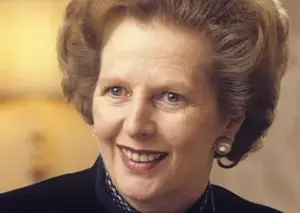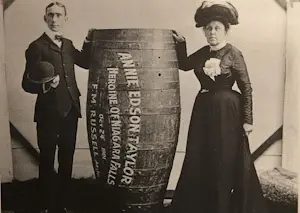
On This Day (October 13, 1925): The Birth of Margaret Thatcher, Britain's First Female Prime Minister
- RetroReelClassics
- Oct 13, 2024
- 7 min read
Updated: Oct 22, 2024

A Historical Overview of Margaret Thatcher's Life and Legacy
On October 13, 1925, the world saw the birth of Margaret Hilda Roberts, a woman who would go on to redefine British politics and leave an indelible mark on global leadership. Born into a modest family in the small market town of Grantham, England, Thatcher’s early years hardly hinted at the powerful force she would later become. As the daughter of a grocer and local politician, she grew up in a community-driven household where the values of self-discipline, hard work, and resilience were deeply ingrained. These qualities became cornerstones of her political persona, shaping her future as the United Kingdom’s longest-serving Prime Minister of the 20th century.
Rock the Rebellion with Punk Rocker at Temple Nile Casino!
On this day in 1925, Margaret Thatcher, Britain’s first female Prime Minister, was born—a figure who stood firm in her convictions. Now, you can embrace a different kind of British rebellion with Punk Rocker by Nolimit City! This gritty, pop art-style slot takes you back to the iconic London punk scene, with symbols like Big Ben, the Union Jack, and a graffiti-covered "Obey Road" street sign.
Play at UK-licensed Temple Nile Casino and claim a 200% bonus up to €500 plus 50 free spins. Time to unleash your inner rebel!
18+ Only. Terms and Conditions Apply. Gambling Can Be Addictive. Please Gamble Responsibly.
The Formative Years: From Grantham to Oxford
Margaret Thatcher’s upbringing was profoundly influenced by her father, Alfred Roberts, a local alderman and lay preacher, whose conservative values and Methodist faith left an indelible imprint on her worldview. The Roberts household was one where intellectual rigor and community service were encouraged, creating an environment in which young Margaret thrived. Her academic talents shone early, leading her to win a scholarship to Kesteven and Grantham Girls' School. From there, her ambitions expanded beyond her provincial life. At the age of 18, Thatcher earned a place at Somerville College, Oxford, where she studied chemistry under the tutelage of the Nobel Prize-winning scientist Dorothy Hodgkin.
While at Oxford, Thatcher’s interest in politics flourished. She became the president of the Oxford University Conservative Association, marking the start of her lifelong dedication to the Conservative Party. Although her initial academic pursuit was in science, her passion for politics grew ever stronger, setting the stage for her eventual pivot into public service. Oxford was also where she began developing her signature qualities of resilience, meticulous preparation, and a pragmatic, no-nonsense approach to problem-solving.
The Path to Politics: An Unwavering Climb
After Oxford, Thatcher worked briefly as a research chemist, but her political ambitions were never far from her mind. In 1950, at the age of 24, she ran as the Conservative candidate for Dartford, a Labour stronghold. Although she lost, her performance was notable, particularly for such a young woman in a male-dominated field. Her determination was undeterred by the loss, and this campaign only fueled her desire to influence British politics on a larger scale.
In 1951, she married Denis Thatcher, a businessman whose financial stability and support allowed her to focus on her political career. She studied law, qualifying as a barrister in 1953. This new qualification enhanced her analytical skills and provided her with a thorough understanding of legislative frameworks—an asset that would become central to her later reforms. In 1959, after years of persistence, Thatcher was elected as the Member of Parliament for Finchley, beginning a political journey that would culminate in her ascent to the pinnacle of British power.
Unlock Classic Entertainment with RedMagic!
Stream classic movies, binge TV series, and dive into timeless books on RedMagic’s powerful smartphones, tablets, and laptops. Enjoy stunning displays, all-day battery life, and smooth performance for an immersive experience wherever you go.
Experience entertainment like never before with RedMagic!
From MP to Prime Minister: The Making of the Iron Lady
Thatcher’s rise within the Conservative Party was rapid. She was appointed Secretary of State for Education and Science in 1970 under Prime Minister Edward Heath’s government. Her decision to end free milk for schoolchildren sparked widespread outrage and earned her the unflattering nickname "Thatcher, the Milk Snatcher." However, the incident also revealed an important aspect of her character: she was willing to make tough, unpopular decisions in pursuit of what she believed were long-term benefits for the country.
In 1975, Thatcher made history by becoming the first woman to lead the Conservative Party, a remarkable achievement in a political environment largely dominated by men. Her leadership style was direct and uncompromising, which earned her both respect and enmity. By 1979, when the Conservative Party won the general election, Margaret Thatcher became the first female Prime Minister of the United Kingdom. She would serve in this role for 11 years, leaving behind a complex legacy defined by economic reform, social unrest, and a profound reshaping of Britain’s global image.
The Thatcher Years: Radical Reforms and Steely Resolve
Thatcher’s government ushered in a new era of British politics, one characterized by a staunch commitment to free-market principles and a reduction in state intervention. Her policies, later termed "Thatcherism," sought to curb the power of trade unions, lower taxes, and privatize state-owned industries. The early years of her premiership were marked by significant economic upheaval as inflation and unemployment soared. Yet, Thatcher remained resolute, famously stating, "The lady’s not for turning," when asked if she would reverse course.
Her role in the Falklands War of 1982 is often seen as a defining moment of her leadership. When Argentina invaded the British-held Falkland Islands, Thatcher dispatched British forces to reclaim the territory, a decision that revived national pride and bolstered her popularity. Internationally, Thatcher forged a close relationship with U.S. President Ronald Reagan, sharing a mutual belief in free markets and strong defense policies. Together, they played a significant role in the Cold War's eventual conclusion, promoting policies that led to the weakening of the Soviet Union.
Controversies: A Polarizing Legacy
Thatcher’s tenure was not without significant opposition. Her government’s decision to close coal mines, a critical livelihood for many working-class communities, sparked the infamous miners' strikes of 1984-1985, creating deep societal rifts. The introduction of the Community Charge, commonly known as the "Poll Tax," led to widespread protests and riots, further eroding her support base. By 1990, internal party disputes and declining public approval forced Thatcher to resign, though she left behind a legacy of profound economic and political change.
A Lasting Legacy
Margaret Thatcher’s legacy is still a subject of intense debate. Supporters credit her with revitalizing the British economy and restoring its standing on the global stage. Critics argue that her policies widened the gap between rich and poor, leaving behind a fractured society. Nevertheless, her role as a trailblazer for women in politics is undisputed. Thatcher not only shattered the glass ceiling in British politics, but she also inspired future generations of women leaders around the world.
Defining a Legacy: Margaret Thatcher’s Life and Leadership
Margaret Thatcher’s impact on British politics is undeniable. As the first female Prime Minister of the United Kingdom, she transformed the nation through her uncompromising policies, strong leadership, and fierce defense of British interests at home and abroad. Understanding the depth of her influence requires looking at various aspects of her life—from her early years in Grantham to the Falklands War, to the internal and external battles she fought during her time in office. Below, we explore three significant works that delve into the different dimensions of Thatcher’s legacy, each offering unique perspectives on the woman behind the Iron Lady persona.
Thatcher in Power: The Battle for Britain
As Prime Minister, Thatcher's leadership was nothing short of transformative. Her policies were radical, and her approach was decisive. The introduction of Thatcherism, a series of free-market economic reforms, reshaped Britain’s economic landscape, reducing the power of trade unions and privatizing state-owned industries. These decisions made her a polarizing figure—admired by many for reviving the British economy, yet despised by others for deepening social divisions.
The Downing Street Years by Margaret Thatcher
In her own words, The Downing Street Years offers Margaret Thatcher’s personal account of her time as Prime Minister. The memoir is a detailed reflection on the major events of her leadership, from the economic reforms that defined her domestic policy to her strong international presence, including her close relationship with U.S. President Ronald Reagan and her role in the Cold War’s waning days.
Thatcher’s recollections of her handling of the Falklands War, the miners’ strike, and her economic policies provide a rare insight into the mind of a leader determined to reshape her country. This memoir reveals her thinking behind some of the most controversial decisions of her career, offering readers an inside view of the trials and triumphs of one of Britain’s most consequential leaders.
Download and read The Downing Street Years by Margaret Thatcher
A Nation Under Threat: Thatcher and the IRA
Thatcher’s time in office wasn’t solely defined by economic and political reform; it was also marked by an intense period of domestic unrest and violence. The conflict between the British government and the Irish Republican Army (IRA) reached a boiling point during her premiership. One of the most pivotal moments of this conflict occurred in 1984 when the IRA attempted to assassinate her in the Brighton bombing, an event that reverberated throughout Britain.
There Will Be Fire: Margaret Thatcher, the IRA, and Two Minutes That Changed History by Rory Carroll
Rory Carroll’s There Will Be Fire takes readers into the heart of one of the most dramatic moments in Thatcher’s premiership—the IRA’s bombing of the Brighton Grand Hotel during the Conservative Party Conference. This assassination attempt, which nearly claimed Thatcher’s life, is explored in detail, shedding light on how the IRA came dangerously close to altering the course of British history.
Carroll’s book delves into the wider conflict between Thatcher’s government and the IRA, examining the political, social, and historical factors that led to this dramatic clash. Through interviews, documents, and gripping storytelling, There Will Be Fire provides a compelling narrative of how this singular moment became a turning point in Thatcher’s career, reinforcing her image as the Iron Lady who stood unflinchingly against terrorism.
Download and read There Will Be Fire by Rory Carroll
Follow us on social media!
X (Twitter) | Instagram | YouTube | Facebook
Disclaimer:
Please note: Some of the links included in this article are affiliate links. This means we may earn a commission at no additional cost to you if you choose to use them. These commissions help us continue to provide quality content and services.






Comments